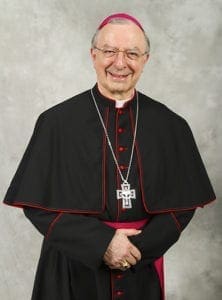Continued commitments to healing and prevention
By BISHOP JOEL M. KONZEN, SM | Published July 8, 2021 | En Español
There is an understandable concern for some Catholics and others that the matter of clergy sex abuse will fade from the list of priority topics that church leadership is monitoring or seeking to address, especially in light of the effects of the recent pandemic and political and societal turmoil.

Bishop Joel M. Konzen, SM
Several things have happened in recent months in the way of initiatives and responses related to clergy sex abuse. Following the 2019 conference held in Rome, called by Pope Francis and named simply “Protection of Minors in the Church,” The Vatican issued in 2020 a 20-page handbook to guide bishops in the reporting of instances of abuse of minors. This did not differ greatly from the procedures already in place in the United States following the “Dallas Charter” statement released in 2002 under the leadership of now-Cardinal Wilton Gregory. The 2020 document seeks to standardize, as much as possible, the protocols for reporting and processing instances of abuse across the 114 conferences of Roman Catholic bishops worldwide.
In May 2020, the Vatican document “Vos Estis Lux Mundi” officially went into effect in the United States, outlining the procedure for individuals throughout the world to report anonymously allegations about abuse of minors that involve a bishop—either through his direct participation or through negligence or oversight on his part. Already one American bishop-elect has resigned as a result of the Vos Estis process, and other investigations are reportedly underway.
In November 2020, the final report on the case of former Cardinal McCarrick was issued by the Vatican, including admission of mistakes made by high-level prelates in failing to follow up on earlier reports of potential violations of the norms in the 2002 charter. McCarrick’s misconduct with adults has perhaps contributed to the revisions in canon law that will go into effect this Dec. 8, which outline potential penalties for abuse involving at least some classes of adults who are considered vulnerable.
In April 2021, Pope Francis presided over an online symposium with religious representatives from around the world, during which concern was expressed by many participants that the phenomenon of sexual abuse within the home or by close relatives or friends likely increased as a result of the pandemic.
During the February 2020 Ad Limina Visit of the Georgia bishops to the Curial Offices in the Vatican, we visited the Pontifical Commission for the Protection of Minors, where we were offered a two-hour presentation by the American director of the commission, spelling out the scope of the problem worldwide and some estimation of where the church stands in addressing it. The commission has been assisted by the Center for Child Protection at Rome’s Pontifical Gregorian University, which on Sept. 1 will become the Institute of Anthropology, Interdisciplinary Studies on Human Dignity and Care, charged with exploring roots of abuse and best means of monitoring and addressing it.
The American bishops receive comprehensive reports from the National Review Board at our annual meetings, detailing progress and specifying steps that should be undertaken to continue to implement the various protocols and to provide the necessary pastoral support for abuse victims. I have, on occasion during the pandemic, taken part in online gatherings of victims of clergy abuse, and I follow the local attempts to gather abuse victims in prayer or on retreat.
Our Archdiocesan Advisory Board meets regularly to address any reports that have been made through the Child and Youth Protection contacts and to ensure that training for all church personnel working with youth is scrupulously adhered to.
As has been noted before, we will never be “done” with this topic because the considerable damage resulting from sexual abuse leaves terrific, painful scars, and the need for the church to repent, repair, and respond is ongoing. We bishops and all in the church must be committed to continued learning and ceaseless prayer in the matter of healing and prevention. May God grant us the humility and insight to stay on course as we welcome changes in the global church response and remain vigilant on the local front.